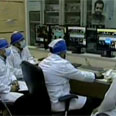
Iran plays down prospects for quick IAEA nuclear deal
Tehran's envoy to UN nuclear watchdog says 'no one should expect that we can solve our problems in a one-day meeting'
Iran's envoy to the UN nuclear watchdog played down prospects for a quick breakthrough in talks on Friday with the agency on a stalled investigation into Tehran's disputed atomic program.
Reza Najafi, Iran's ambassador to the International Atomic Energy Agency, was asked by reporters whether he expected an agreement in discussions due to start with the IAEA at around 10 am (0800 GMT).
Related stories:
The meeting between Iran and the IAEA will be the first since Hassan Rohani, a relative moderate, took office as new Iranian president in early August, pledging to try to resolve the Islamic state's nuclear dispute with the West.
It comes after talks between Iran and world powers at the United Nations on Thursday.
Video courtesy of jn1.tv
"This is the first meeting so nobody I guess should expect that in just (a) one-day meeting we can solve (our) problems," Najafi, who was appointed new Iranian ambassador last month, said.
"We are going to have a first meeting with the agency. We expect to review the existing issues and also exchange views on the ways we can continue our cooperation to resolve all issues."
Chief IAEA inspector Herman Nackaerts used similar language as he arrived: "We are looking forward to discuss how we can intensify the dialogue to resolve all outstanding issues."
For several years, the IAEA has been investigating suspicions that Iran may have coordinated efforts to process uranium, test explosives and revamp a ballistic missile cone in a way suitable for a nuclear warhead.
Iran says the allegations are baseless, but has pledged, since Rouhani took office in early August, to expand cooperation with the UN agency. Western diplomats have accused Iran of obstructing the IAEA investigation.
Iran and the United States held their highest-level substantive talks in a generation at the United Nations, saying the tone was positive but sounding cautious about resolving the standoff.
US Secretary of State John Kerry and Iranian Foreign Minister Mohammad Javad Zarif met after Zarif held wider talks with the United States and other major powers to address Western suspicions that Iran may be trying to develop atomic weapons.
Separately from big power diplomacy to resolve the decade-old dispute that could yet trigger a Middle East war, the IAEA has held 10 rounds of talks with Iran since early 2012 to try to resume a blocked inquiry into suspected atom bomb research.
The talks have so far yielded no results but Western states see Friday's meeting in Vienna as a litmus test of any substantive Iranian shift from its intransigence under Rohani's hardline conservative predecessor, Mahmoud Ahmadinejad.
Iran denies it is seeking to develop the capability make nuclear weapons, saying its program is a peaceful bid to generate electricity.
Olli Heinonen, a former IAEA chief inspector, and Simon Henderson, of the Washington Institute for Near East Policy, said Iran had "failed to cooperate with the IAEA in resolving questions about whether it has performed design work on an implosion-type atomic bomb."
"This is key to judging the honesty of Tehran's claims that it has never intended to pursue nuclear weapons," they said in an analysis this week.
- Receive Ynetnews updates directly to your desktop










